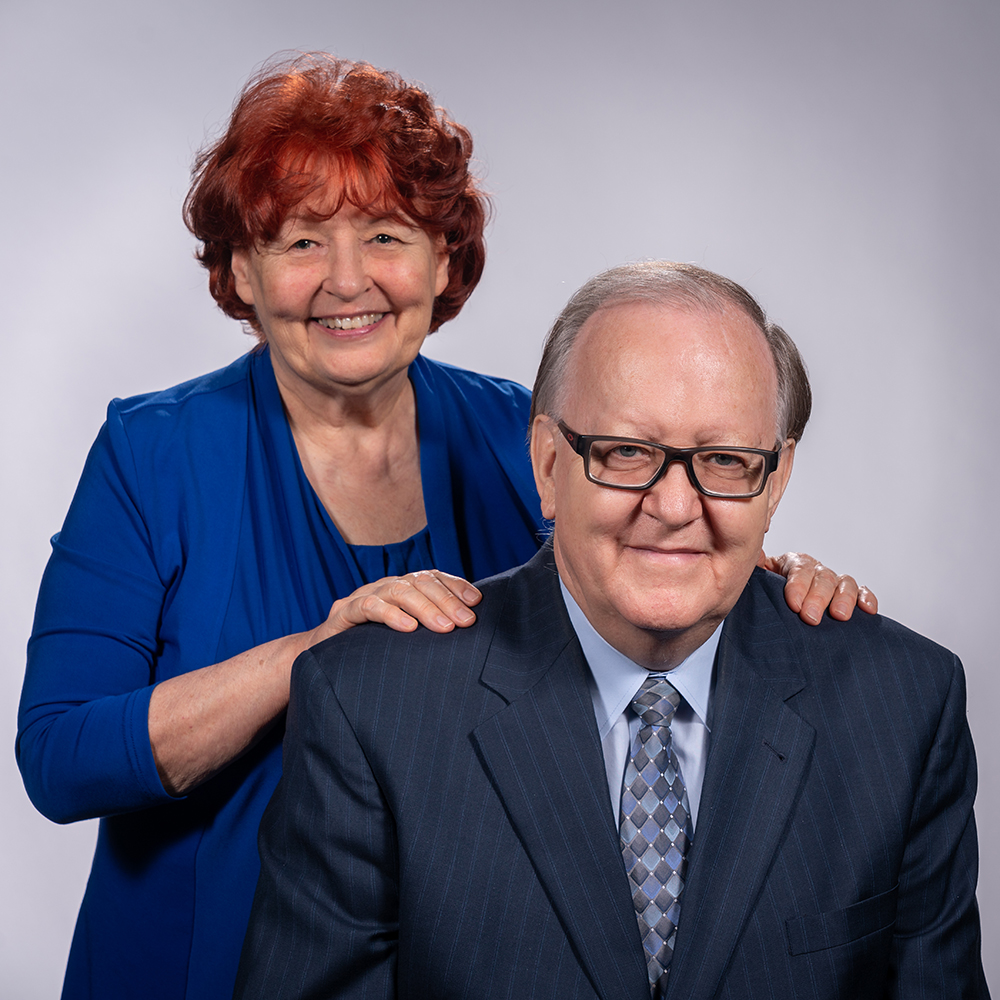
Dan and Donna Jackson
Daniel R. Jackson has served as president of the Seventh-day Adventist Church in North America for 10 years. He and his wife, Donna, an associate director for the NAD’s Ministerial Association, are retiring on July 1, 2020. Dan Weber, NAD communication director, recently sat down with the Jacksons to talk about their ministry, church life, fond memories, and what they hope for the future for the church.*
Let’s talk about the beginning of your ministry. When did you decide you wanted to be a pastor?
Dan: My mother used to take me to camp meeting every year when I was a boy. I would go and listen to the preachers preach, and then go back to my room. I’d put a book under the springs of the next bunk bed, and I’d read the book and then start preaching it. When I was about 18 or 19, the Lord moved in my life to invite me to enter into ministry.
When did you meet Donna for the first time?
At 18 or 19 years of age. She had given her life to Christ. She was a Christian. And I was not, to put it plainly. I was an attendee at our academy, but it was long talks and long discussions with her that made me affirm my own connection with God. She was an influence. My mother was an influence. God, I believe, moved in my life around that time.
Donna, what were your thoughts when you looked at having a life together and going into ministry?
Donna: I didn’t mind that at all. I really love God. He is first in my life, and I had thought I’d like to be a Bible worker, so being a pastor’s spouse sounded pretty good. When we were dating, [Dan] had no intention of being a minister, so that did come after. Actually, he had an accident coming out to our wedding that was instrumental.
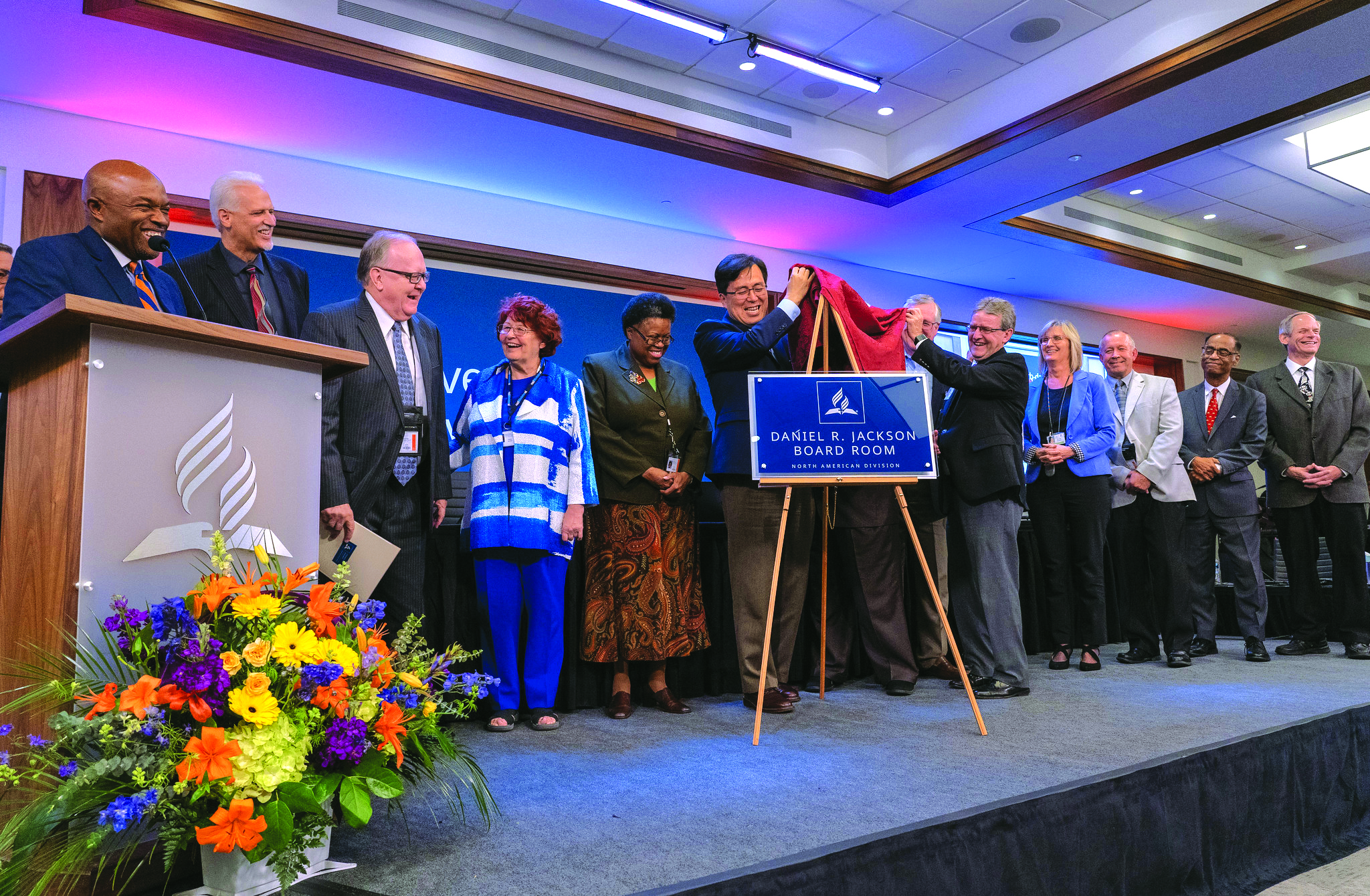
At the 2019 NAD Year-End Meeting, Dan Jackson, NAD president, and his wife Donna, smile during a special presentation as the executive boardroom's new name is unveiled. Photo by Pieter Damsteegt
Tell me about that.
Dan: I had just learned to drive, and bought a car. On my way to our wedding I fell asleep on the highway six miles east of Chase, British Columbia, and went down a 10-foot bank. I was slightly injured. One of the passengers in the vehicle didn’t have a life-threatening injury, but it was a life-altering injury. We have been friends ever since.
At that point I thought very seriously, Why did God preserve my life? That’s when I made the decision that I’d commit my life to God. I went to Canadian Union College, which is now Burman University, to study ministry.
Let's talk about music. Would you say that music has played a role in your life and ministry?
Dan: I was always interested in music. When I was a 12-year-old kid, I made myself a little radio. I wound the wire around the spool, and then connected this with that, and glued this and that. I used to listen to music while I studied. I didn't learn anything about what I was studying, but I remembered all the music I listened to. [laughter] When I was 17 years of age I fell in love with a young woman [named Donna] who had a huge gift for music. And I was singing in a traveling quartet, so it's just been a part of my life. I love music. I . . .
Donna: Can I suggest something?
Dan: Sure.
Donna: Perhaps it was a coping mechanism for growing up, because it was a pretty tough family to grow up in. His dad was alcoholic and abusive, and so [Dan] went into his own world, and coped with it, possibly. I'm not sure.
Dan: We've never discussed that before, but it could be. I think that's a good observation. . . . But I've always loved music, and I've always sung it. And I never hesitate.
That has served your ministry well, because as an administrator sometimes you’ve had difficult situations. And you'll come in and sing a little song, and it helps to lighten the room a bit. And then we get back to the serious business of work. I've appreciated that. Do you have a favorite musician, or a genre of music?
Some of the saints will probably be disappointed in me, but I have liked the Beatles. And I’d say that my all-time favorite is the Beach Boys — of that time period. But frankly, my musical tastes are quite eclectic and include hymns, classical, gospel.
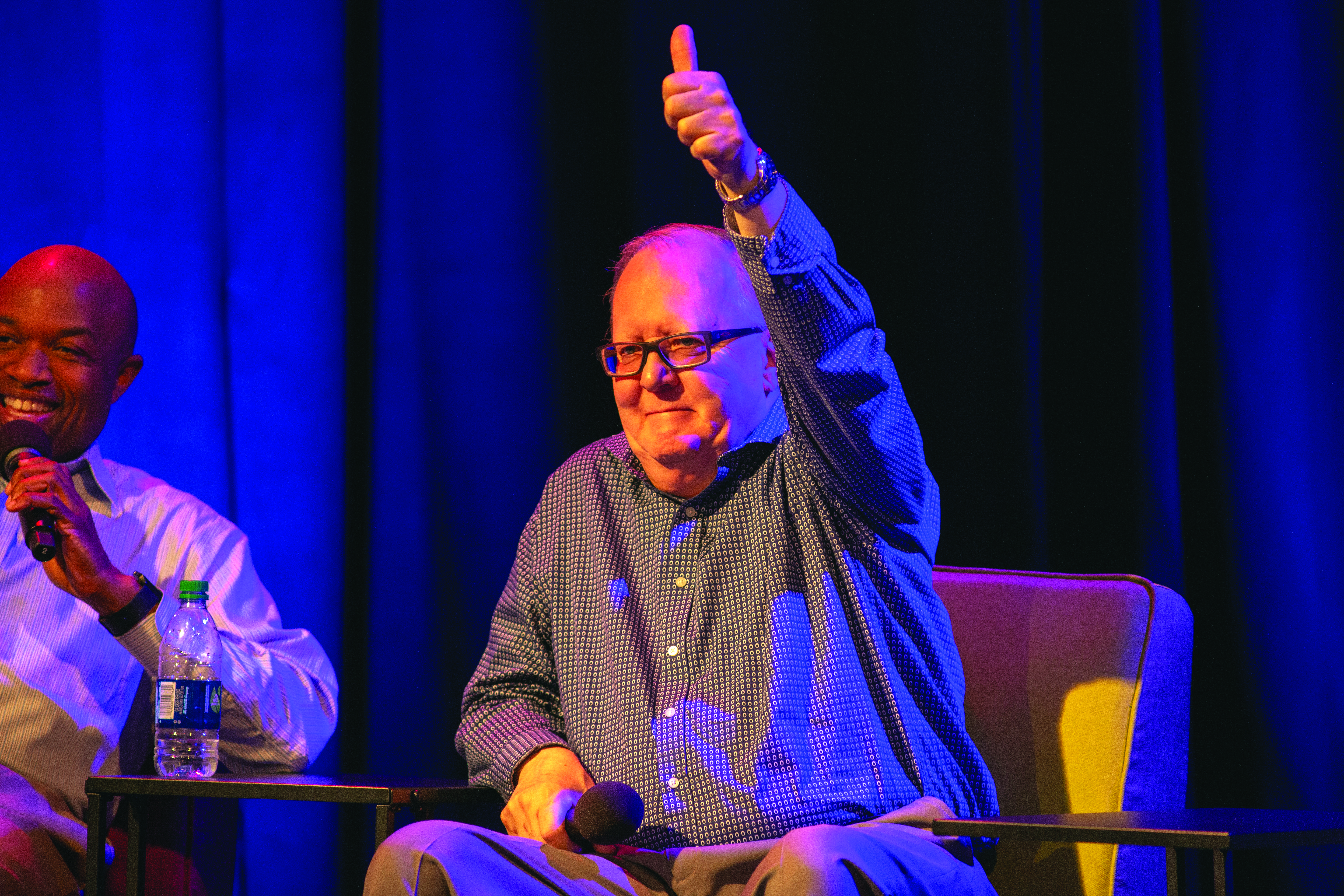
At the live-streamed event, Is This Thing On? held in Berkeley, California, in 2019, Dan Jackson gives a young adult's comment a "thumbs up." Photo by Pieter Damsteegt
Switching gears: Did you ever think you would end up as a church administrator?
Not even a chance. [laughter]
As a matter of fact, the first time I was invited to do any administrative work, we were in Asia, and I was serving as a pastor. They made this suggestion to me, and I looked at the person and said, “Do I look like a union man to you?” [laughter]
I had no aspirations to be an administrator. And no clue that it would ever happen. We believed that Jesus was coming so soon that our little daughter wouldn’t even get into first grade. Our burning desire was just to win souls for Jesus and see Him return.
You mentioned Asia, so let’s talk through some of the places where you’ve served. What happened after you finished at Canadian Union College?
I was a pastor in Grand Prairie, Alberta, which is 280 miles north of Edmonton. We were there for one year prior to going to seminary. After seminary at Andrews University we went to Edson, Alberta, to a place with no church and a small congregation. We had the privilege of doing evangelism and building a church there. After we left, we went to Penticton, British Columbia, and from Penticton to Kelowna. From Kelowna we received a call to go overseas to Sri Lanka. We went from Sri Lanka to Spicer Memorial College in India, where I was a teacher, the campus chaplain, and pastor of the church. After five years overseas, we went back to the church in Penticton.
How did your time in Asia impact your ministry?
Donna: We came to love diversity. At Spicer Memorial College we had students from Africa, Asia, the Far East, and the Middle East. We loved that richness in diversity. I think it opened our eyes. We learned that our Western culture is not the only — or the best — culture, and that we should explore and be open-minded. It’s so easy to love people from all around the world because, even with our diversity, we’re so similar.
Dan: Rather than being concerned, we celebrated the beauty and diversity of culture. That has shaped our thinking in terms of differences of opinion. I thought, People are different. They have a right. And different cultures — they exercise what they consider to be the best. There are things about other cultures that we don’t like, but that doesn’t mean that we reject the entire culture because of a few things that we don’t prefer.
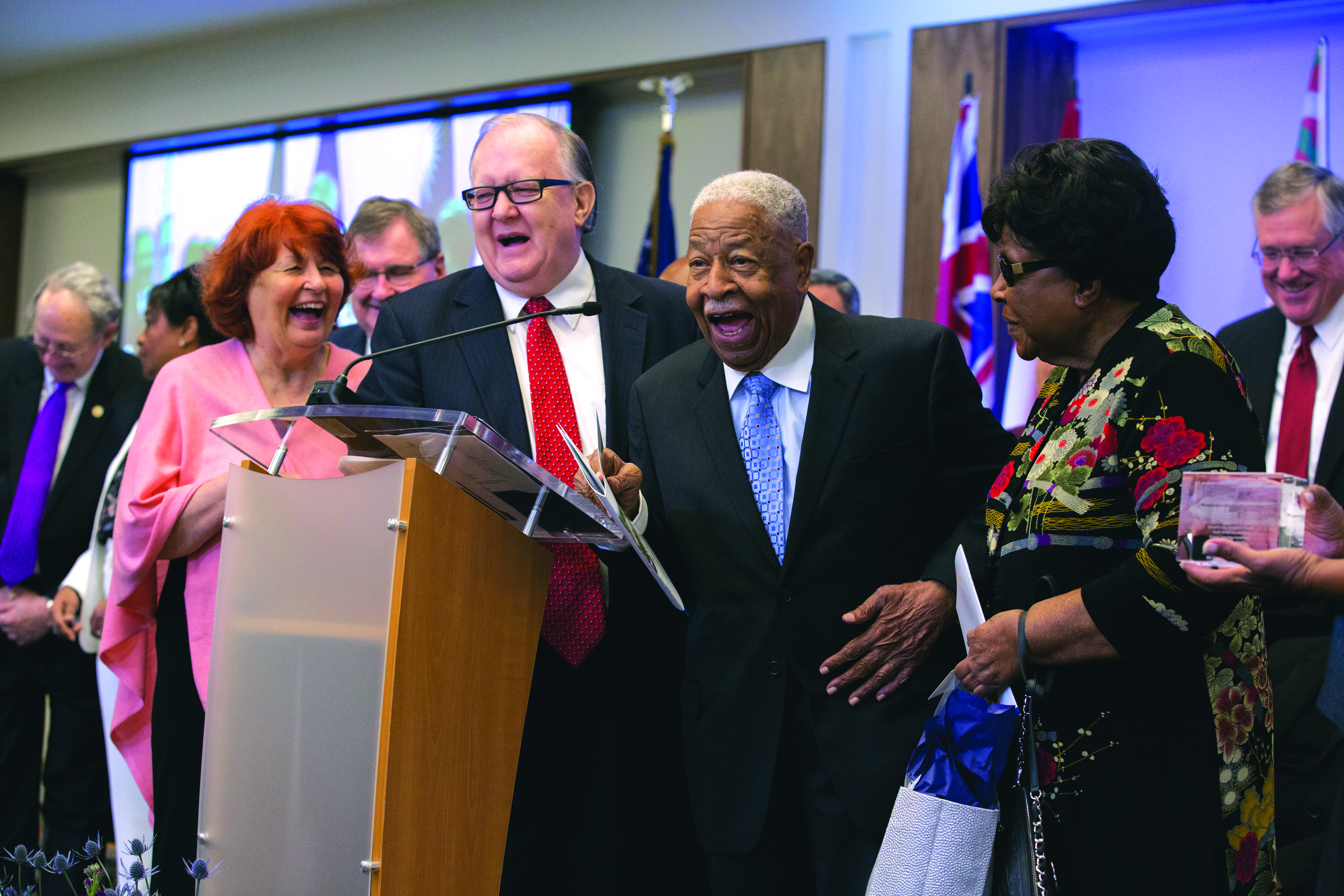
Dan and Donna Jackson present Charles E. Bradford, first and former NAD president, and wife Ethel, with gifts during the NAD headquarters' dedication program on Oct. 26, 2017. Photo by Pieter Damsteegt
Donna, you two have been a ministerial team. But let’s talk about your role and experiences here at the North American Division.
Donna: I’ve been very fortunate to work in the Ministerial Association with an energetic team. They involve me in what they’re doing, but my special task is ministerial spouses and their families. I get to meet inspiring people from around the division. One spouse I met recently is tackling the problem of opioid addiction. One started a free medical clinic in the North Pacific. One tackled sex trafficking. The NAD, four or five conferences, and a union conference have partnered with her. There are so many wonderful experiences that I’ve been blessed to be a part of through the years.
Meeting all these people is the neat part of being the president’s wife. I wouldn’t know them otherwise. And I’m just touching the surface. Creating resources for them has been important. I have a special heart for new spouses coming into it. We’ve created electronic resources and some books for them—for administrator spouses and new presidents’ wives—and we’ve increased it to various administrators’ spouses.
Dan, there are a few initiatives that you will probably be remembered for: education, young adult retention, big data and social media; refugee and immigrant ministries; transformational evangelism; and women in pastoral ministry. Let’s talk about that last one.
This will always be a significant part of my lifework. Way back, while I was a pastor of the Rutland Seventh-day Adventist Church in Kelowna, British Columbia, we introduced female elders. I saw the quality of the leadership they provided, the intense way in which they undertook ministry, and wondered, Why can’t women serve not only as pastors but as leaders in the church? They certainly do in the world. While we were in India, Indira Gandhi was the prime minister. Sri Lanka had a woman leader as well in Sirimavo Bandaranaike. Other countries have, of course, including Angela Merkel who serves Germany today.
I have always had the belief that women ought to be treated on an equal basis with men. God has gifted women just as He has gifted men. He’s called women just as He has called men. There’s ample evidence and direction of that in Scripture.
When I came to the North American Division, we thought through some of the strategic initiatives you’ve enumerated that the NAD team would undertake together. Women in ministry was one of the highest priorities.
I am a believer that women have the capability to serve not just as pastors but as leaders in the church. We have women serving all the way up to the secretariat, but we make sure that only men get the presidency. The women in ministry initiative not only is needed, but answers the needs of women who have been called to serve. I’ll give one illustration. At a women in pastoral ministry conference in Fort Lauderdale, Florida, a woman came to me with tears streaming down her face. She said, “I’ve just gotten a call to ministry. I want to thank you. I’ve waited for 20 years from graduation.”
That left an indelible mark in my mind. Women have capabilities to serve in pastoral roles, and we have the privilege of doing our best to make sure we have as many as we can. Obviously, no one’s career stretches on ad infinitum, but if mine could, one of the things I’d love to see would be 1,000 female pastors in the North American Division. We have about 200 now, and when we started, we had only 100. There are 136 women enrolled in the seminary this year. I pray that all of them get placement.
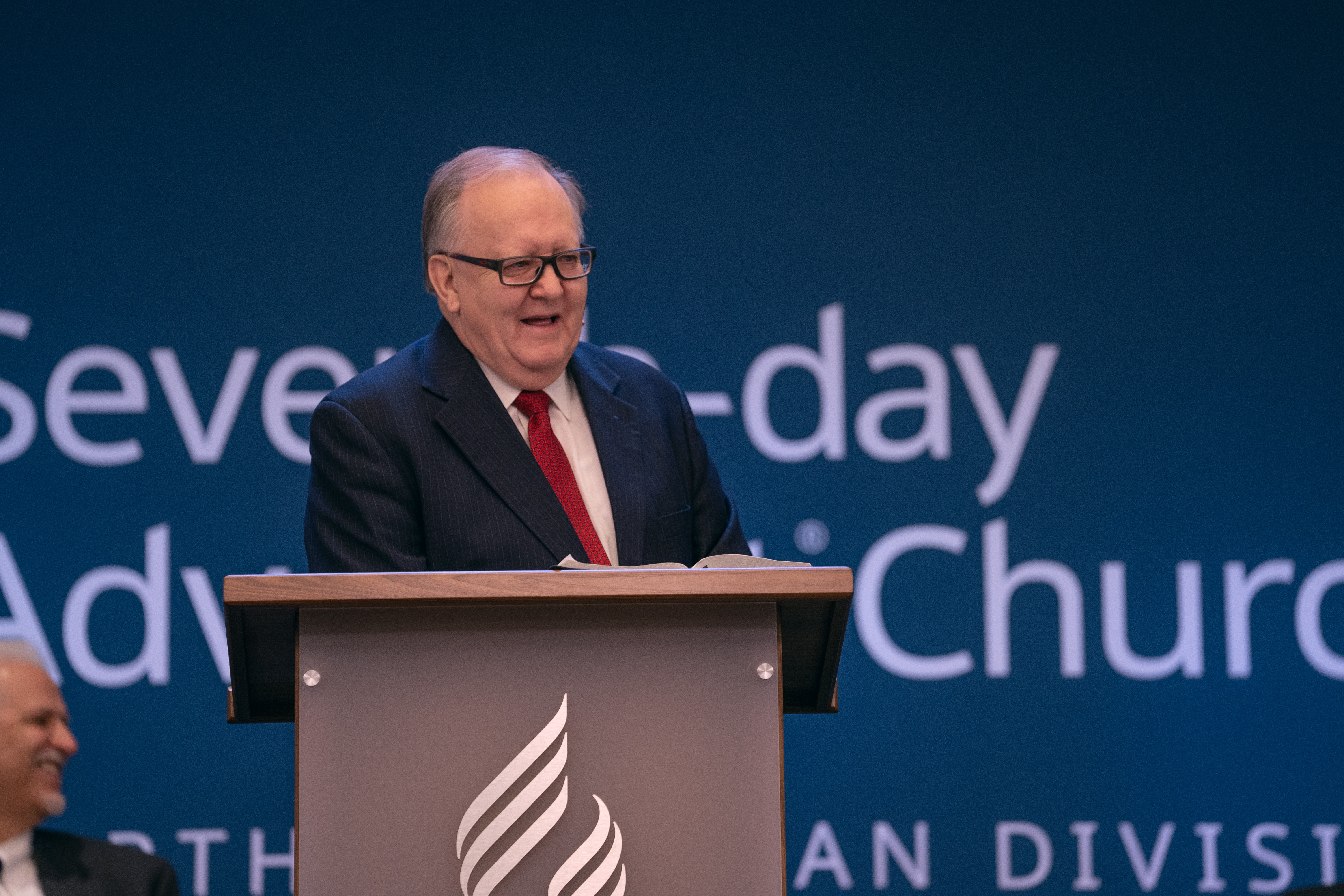
Dan Jackson preaches during the 2019 NAD Year-End Meeting Sabbath. Photo by Pieter Damsteegt
Let’s go back to 2010. You’re in Atlanta, Georgia, representing the Seventh-day Adventist Church in Canada at the General Conference Session. Suddenly you become NAD president. A little unexpected?
It was totally unexpected. As a matter of fact, a conversation that Donna and I were undertaking that weekend was about my role in Canada. She said, “OK, you’ve been the president of the Adventist Church in Canada for nine years. You need to step down.”
I was kind of pushing back at that. But finally in our discussions I thought to myself, She is right. So I prayed a simple prayer: Lord, I’m open to leaving my role at the Seventh-day Adventist Church in Canada. All I’m asking You for is an assignment with a little challenge. And God was listening. [laughter]
Tell me about your phone call with Donna.
I sat in that room, in the nominating committee, and six names were listed. We’d come to the end of that list. Mine was not one of them.
Then it happened — all of a sudden, at the last second, my name was put on the list. I was in shock. Then they did the voting.
I fled the room, and I phoned the hotel, saying, “Donna, are you dressed? Because if you’re not, you need to get dressed and get over to the auditorium.”
She asked, “Why?”
I said, “Because they’ve just nominated me as president of the North American Division!” And I’m kind of emotionally laughing at this.
Donna: He said it very quietly.
Dan: I said it very quietly.
Donna: And slowly.
Dan: Her response was: “Well, whatever for?”
We proceeded over, and they elected us at the general session. It was, for both of us, a total shock. Anyone who thinks that we either had it in our minds or that people had set it up for us, they’re just wrong. As a matter of fact, one of the more humorous things that happened was that on the nominating committee, once the vote was announced, a member who was newer to the experience of the nominating committee said right out loud, “Well, who is this Jack Daniels?” They didn’t know either. They were as shocked as I was. [laughter]
I remember saying, however, at my first interview, that “the North American Division will have a strategy. We will build strategy, number one. And second, we will build a ministerial department again.”
At the time it was pretty overwhelming. But at the end of the day I knew that I was simply a disciple of Jesus Christ and that He would help me keep things simple and not allow me to go off into nonsense.
As you’re moving into retirement, in the next stage of your life, is there something new you’re going to try? What do you plan to do?
I’m going to try woodworking. I want to build a dresser, and have already started to accumulate some tools. Depending on where we are, I’ll probably try to take some classes so that I learn how to do the woodworking. And to be honest, I’d love to learn to play the guitar.
That will be one of my things. I don’t intend to quit preaching or teaching. I want to be available to that after about a year of clearing my head. But I do want to, once we’ve settled in our home.
Donna, what will you remember most about the past 10 years?
I have so many wonderful memories. But ultimately, to see our people loving people — that’s what it’s all about. While important, it’s not about growing our church into the biggest church and the fastest-growing church. . . . It’s about sharing God’s love.
I’m so thankful that after 10 years, despite all of the other things that have been less than beautiful in our church, we have many, many thousands of people, I believe, who are caring for their neighbors and loving their neighbors, and doing just what God wants them to do. We always have lots of room to grow, but Jesus is present in our division.
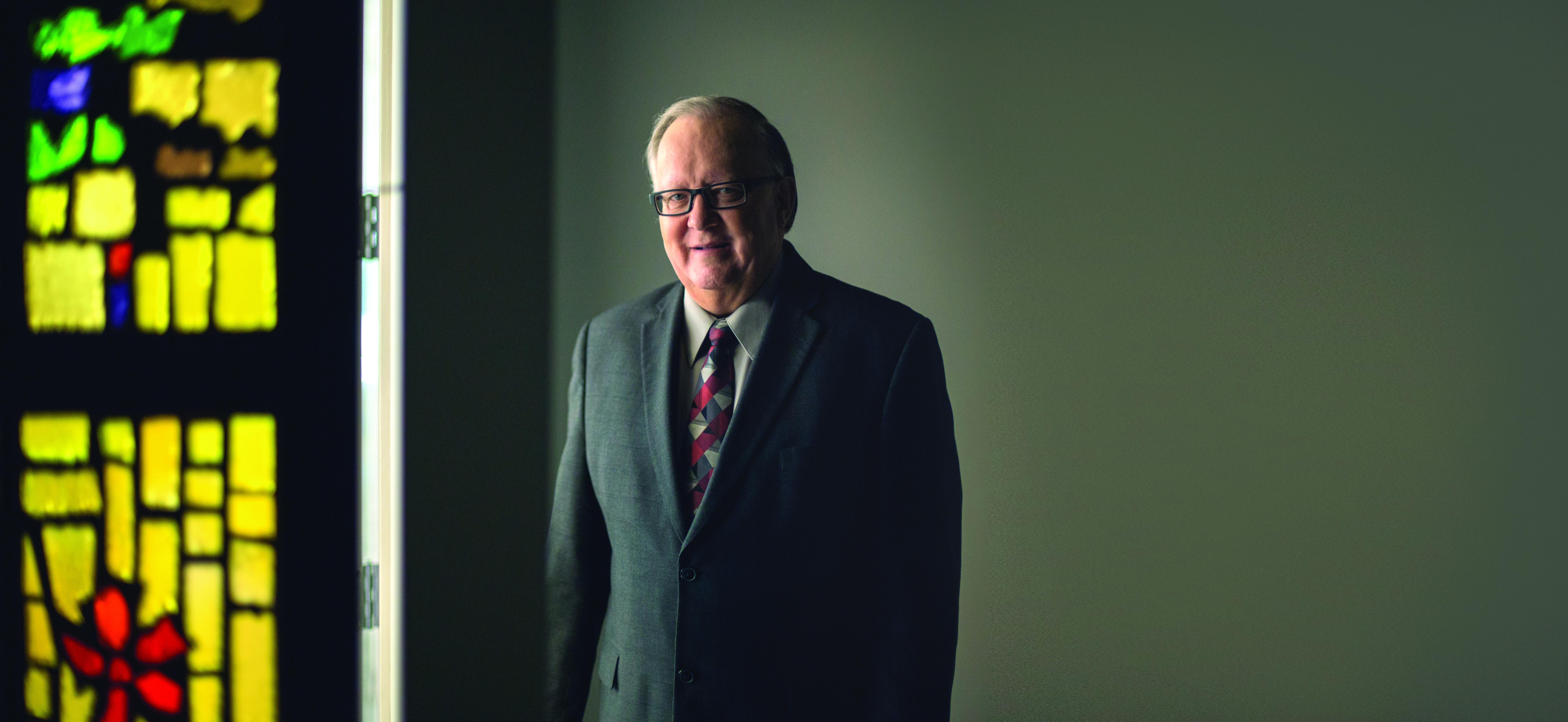
Dan Jackson spends a moment in reflection inside the NAD headquarters C.D. Brooks Prayer Chapel. Photo by Pieter Damsteegt
Dan, is there anything you’d like to be remembered for as your time as the NAD’s president comes to a close?
What I’ll cherish most is the idea that during our time we were able to help get the mission of the church in focus. That all of the adjustments we made administratively were shaping, shaping, shaping the idea that this work has only one target: under the direction of Jesus we are moving forward in mission. I pray that mission continues to remain our church’s focus.
Serving has always been a privilege. The real privilege of all this has been meeting with our people from coast to coast, throughout the North American Division: in Canada, the United States, Bermuda, Guam, and Micronesia. To meet with our people . . . the perk of the job is to see the wonderful mission focus that many of our members have. This division is about mission.
I’ve always held the idea that God would move us into this role in great reverence. I have not enjoyed every day, and I’ve said this plainly, . . . But it is the people that make the job very rich and a huge blessing. I deeply respect and revere what God is willing to do in the life of a scamp from Edmonton, Alberta, and a wonderful woman from Sidney, British Columbia.
*This interview has been edited for space and clarity; and will appear in the July 2020 Adventist Journey magazine.
